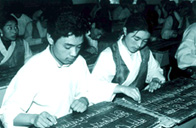|
 Ma
Xinlan is the principal of the Girls' Primary School
of Hui People in Weizhou Town of Tongxin County, Ningxia
Hui Autonomous Region. Located in a mountainous region,
Weizhou Town was a poor place. When Ma Xinlan graduated
from a primary school in 1965, elementary education
in the town was far from being universal. Because of
this and the influence of traditional thinking, many
girls did not attend school. Ma Xinlan was the only
girl to keep attending school until graduation in the
whole town. Neighbors told her mother not to let Ma
Xinlan attend a middle school in the county town 75
kilometers away because "grown-up girls should
not show their face in public but should stay at home
to wait for marriage." But Ma Xinlan attended the
middle school with her mother's blessing. Ma
Xinlan is the principal of the Girls' Primary School
of Hui People in Weizhou Town of Tongxin County, Ningxia
Hui Autonomous Region. Located in a mountainous region,
Weizhou Town was a poor place. When Ma Xinlan graduated
from a primary school in 1965, elementary education
in the town was far from being universal. Because of
this and the influence of traditional thinking, many
girls did not attend school. Ma Xinlan was the only
girl to keep attending school until graduation in the
whole town. Neighbors told her mother not to let Ma
Xinlan attend a middle school in the county town 75
kilometers away because "grown-up girls should
not show their face in public but should stay at home
to wait for marriage." But Ma Xinlan attended the
middle school with her mother's blessing.
In the
early 1970s, Ma Xinlan became a primary school teacher.
Fourteen years later, she set up the Girls' Primary
School of Hui People. At the time, only 42 percent of
school-age girls in
|
|
Weizhou
Town attended school. Ma Xinlan decided to change the
situation. She and the teachers of her school went from
door to door, persuading people to send their girls to
school. In accordance with local economic conditions,
her school offered courses on handwork and rural practical
techniques in addition to regular curricula to make the
students clever and deft and enable them to stand on their
own feet. Eight years later, school attendance among girls
in the town reached 94 percent . As a result, Ma Xinlan
won a "May 1" Labor Medal.
After
the founding of the People's Republic of China, the state
established across the country a number of secondary normal
schools and normal colleges devoted to the cultivation
of teachers for ethnic minority people. In 1985, relying
on the Northwest China Teachers University, the state
established a Teachers Training Center for Ethnic Minority
People in Northwest China that is to serve five provinces
and regions in northwest China (Shaanxi, Gansu, Ningxia,
Qinghai and Xinjiang). The center offers education at
five levels: preparatory, specialized training, advanced
studies, undergraduate and graduate. And it enrolls students
from 27 ethnic minorities, including Tibetan, Hui, Mongolian,
Uygur, Kazak, Salar, Dongxiang and |